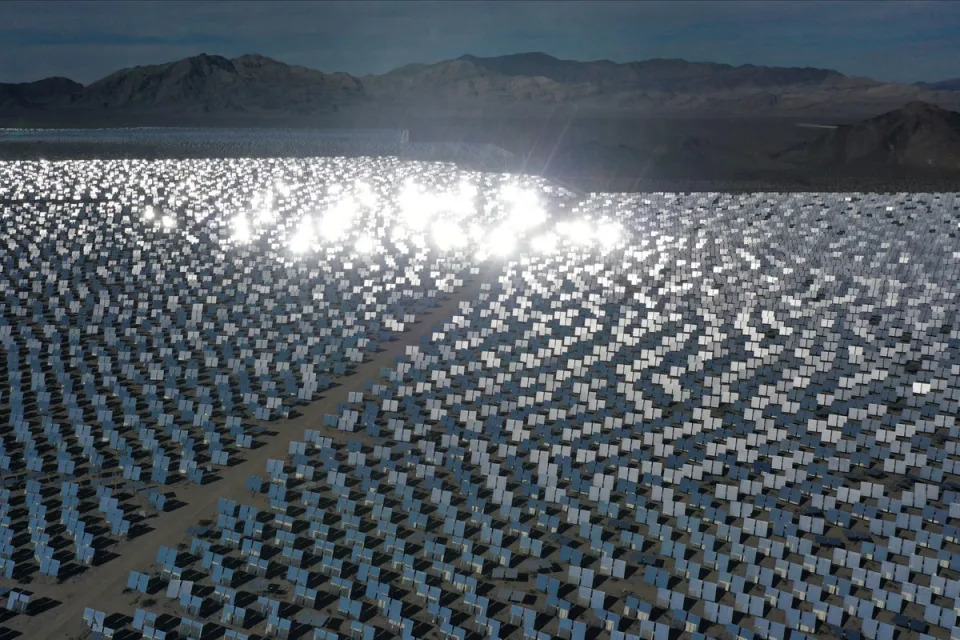Louise Boyle
Wed, 8 February 2023

FIELD OF BIRD FRYERS
The US power grid is set to boost its electricity generation this year – and more than half of that capacity will be solar power.
The country’s utility-scale solar has quickly ramped up over the past decade due to advances in technology and increased efforts to decarbonise society-wide to battle the climate crisis.
In 2023, some 54 per cent of solar power will be added to the grid along with 17 per cent of battery storage, according to the latest electric generator inventory from the nonpartisan Energy Information Administration (EIA).
The optimistic renewables outlook comes after a short-term blip. New utility-scale solar declined by 23 per cent in 2022 from 2021 due to impacts of the Covid pandemic and supply chain disruptions, EIA said.
However, the agency reported that some delayed 2022 projects will begin operating this year. If all the capacity comes online, it means it will be the most new, utility-scale solar added in a single year – doubling the record set in 2021.
Some 41 per cent of this new solar capacity will be in the sunshine-abundant states of Texas and California.
Battery storage is also expected to double in 2023, in tandem with the rise in solar and wind power which provide clean but intermittent energy. The EIA says that 71 per cent of the new battery storage will be in California and Texas alongside the solar and wind projects.
On the flip side, fossil fuel operations will make up the vast majority of power-generating sources retired this year.
Coal and gas plants are set to make up 98 per cent of those being wound down in 2023, EIA reported
.

How the US grid will expand its capacity in 2023 (EIA)
The agency noted that “substantial” amounts of coal-fired power, the dirtiest of fossil fuels, have been retired in the past 10 years. Most plants date back to the 1970s and 1980s and cannot compete with modern gas-fired power plants and low-cost renewables.
The largest coal-fired power plant expected to retire is the WH Sammis Power Plant in Stratton, Ohio that began operating in 1960.
The oldest four of the plant’s seven coal-fired units were retired in 2020 and the last three units will be shut down this year, along with the plant’s five petroleum-fired units. Pleasants Power Station near Belmont, West Virginia is the second-largest being shuttered.
Energy Harbor, which operates both plants, has a goal to supply 100 per cent carbon-free electricity by the end of 2023.
Three aging gas-fired plants in California are also set for retirement in the next 12 months. They were originally to be closed in 2020 but kept on for an extra three years to maintain grid reliability.

How the US grid will expand its capacity in 2023 (EIA)
The agency noted that “substantial” amounts of coal-fired power, the dirtiest of fossil fuels, have been retired in the past 10 years. Most plants date back to the 1970s and 1980s and cannot compete with modern gas-fired power plants and low-cost renewables.
The largest coal-fired power plant expected to retire is the WH Sammis Power Plant in Stratton, Ohio that began operating in 1960.
The oldest four of the plant’s seven coal-fired units were retired in 2020 and the last three units will be shut down this year, along with the plant’s five petroleum-fired units. Pleasants Power Station near Belmont, West Virginia is the second-largest being shuttered.
Energy Harbor, which operates both plants, has a goal to supply 100 per cent carbon-free electricity by the end of 2023.
Three aging gas-fired plants in California are also set for retirement in the next 12 months. They were originally to be closed in 2020 but kept on for an extra three years to maintain grid reliability.
No comments:
Post a Comment